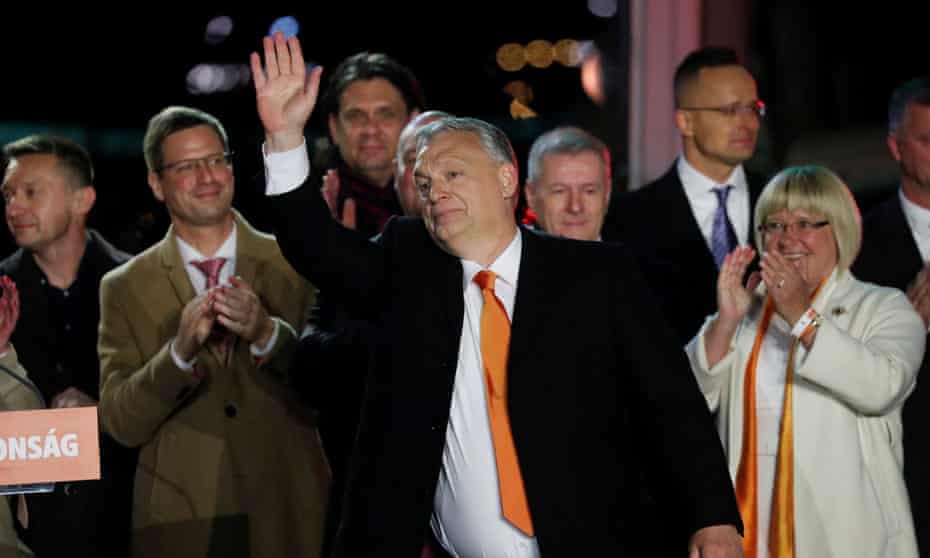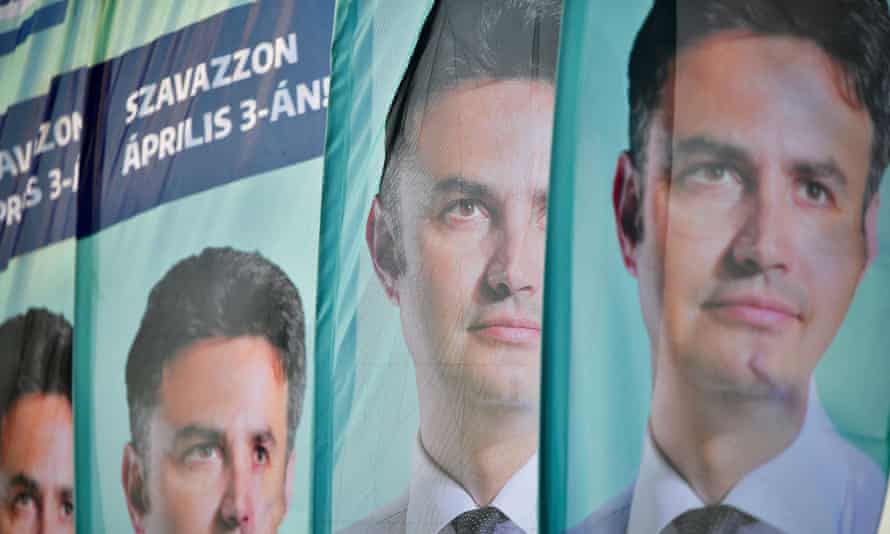Hungary’s Right-Wing Nationalist Leader Viktor Orban Wins Fourth Term as Prime Minister
Viktor Orbán wins fourth consecutive term as Hungary’s prime minister
Rightwinger and Putin ally aims dig at Ukraine’s Volodymyr Zelenskiy after Fidesz party claims another super majority

Viktor Orbán has won a fourth successive term as Hungary’s prime minister, capping a campaign dominated by his controversial stance on Russia’s invasion of Ukraine with a speech that appeared to mock Volodymyr Zelenskiy, the Ukrainian leader.
Ecstatic chants of “Viktor, Viktor” greeted Orbán as he addressed supporters of his Fidesz party outside its election headquarters on the banks of the Danube in Budapest as results made the scale of his victory apparent.
With nearly 86% of the vote counted on Sunday night, Fidesz was on course to increase its parliamentary majority by winning 135 seats in the 199-member parliament, crushing a six-party opposition bloc that united to form a common front aimed at unseating Orbán.
Instead, the ruling party has retained its two-thirds super majority, which has enabled it to reshape Hungarian politics and social policy during its 12 years in power.
The popular vote margin was 53.7% for Fidesz to 34.4% for the United for Hungary opposition grouping, fronted by Péter Márki-Zay, who conceded defeat on Sunday night.
“The entire world can see that our brand of Christian democratic, conservative, patriotic politics has won,” a smiling, swaggering Orbán – with members of his cabinet behind him – told the crowd, standing in frigid temperatures. “We are sending Europe a message that this is not the past – this is the future.”
Orbán also made reference to criticism directed at him by Zelenskiy, who has repeatedly challenged the Hungarian leader over a perceived lack of support and an unwillingness to condemn his close ally Vladimir Putin in person for the invasion of Ukraine.
“This victory is one to remember, maybe even for the rest of our lives, because we had the biggest [range of opponents to] overpower. The left at home, the international left, the bureaucrats in Brussels, the money of the Soros empire, the international media and even the Ukrainian president in the end,” he said to laughter from the crowd.

Conceding defeat, Márki-Zay said he was “devastated” and attributed its scale to Fidesz’s gerrymandering methods and other changes to the voting system while in office.
“I don’t want to hide my disappointment and my sadness. We never expected this to be the result,” he said.
“We knew beforehand that this was going to be an imbalanced fight. Yes, they’ve cheated too. But we’ve also said that since there is no democracy in Hungary and they’ve changed the whole system, the districts.”
Orbán’s party has strengthened its hold on office through a favourable media ownership structure and changes to the voting system that critics say renders elections unfair.
Márki-Zay, a 49-year-old economist, has complained bitterly that he was given only five minutes of airtime on public TV to state his case.
The opposition has also complained that Fidesz has a huge advantage in election spending and communication. It said it had about 2,000 election advertising billboards throughout the country to 20,000 for the governing party.
Akos Hadhazy, an opposition MP, said: “Orbán can get any of his lies to Hungarian people. Even if we hire the best communication experts, the government will always win these races because they can get their messages to much more people than we can.”
Even before polls closed, opponents called attention to possible voter fraud – the possibility of which prompted the Organisation for Security and Cooperation in Europe (OSCE) to dispatch a 200-strong team of election observers.
The OSCE’s office for democratic institutions and human rights has criticised what it said was blatant gerrymandering in several constituencies. Analysts predicted that gerrymandering would mean United for Hungary needed to win about 5% more of the popular vote than Fidesz to stand a chance of gaining a parliamentary majority.
The Clean Vote Coalition – a grouping of four Hungarian NGOs – said it had received numerous complaints of irregularities. They included electors being offered 10,000 Hungarian forints (£23) for their vote and, in another location, meat being on offer as an inducement. There were also reports of illegal bussing of voters.
Fears of fraud had been fuelled before polling day after a large number of election ballots – most of them said to be for opposition candidates – were reportedly found partly burned in a sack at a landfill site last week in the Romanian region of Transylvania, where many ethnic Hungarians have dual citizenship and voting rights.
Fidesz’s victory came after high voter turnout – a factor experts assessed would help the governing party – despite frigid temperatures and wintery weather.
Orbán’s fourth term, which will become his fifth overall, may also pose a possible conundrum for Nato and the EU amid mounting concerns over Hungary’s attitude to Russia’s invasion of Ukraine and whether it is a reliable alliance partner.
Although Orbán has so far not attempted to block sanctions and military responses to the attack, he signalled an unwillingness to contemplate measures that would cut supplies of Russian oil and gas.
He has also refused to allow the supply of weapons to Ukraine or permit military aid to pass through Hungarian territory, angering Nato allies and Zelenskiy, who has branded him Putin’s sole European supporter.
Orbán, who has forged a close relationship with the Russian leader and met him 12 times, retooled his election campaign after the outbreak of war on 24 February to position Fidesz as the “peace” party, vowing to stay out of a conflict that he insisted had nothing to do with Hungary.
He said reducing energy dependency on Russia – which provides an estimated 90% of its gas and 65% of its oil – would wreck Hungary’s economy.
At the same time, he cast Márki-Zay’s opposition bloc, which has called for closer cooperation with the EU and Nato, as “warmongers” who strove to send weapons and Hungarian troops to Ukraine.
There has been speculation that Orbán – who has consistently forged bonds with Russia and China, cast the EU as an enemy, and styled himself in recent years as “illiberal” leader – would pivot to a more pro-western stance after securing his re-election.
However, Daniel Hegedus, a Hungarian analyst with the German Marshall Fund, played down such expectations.
“There may be some realignment towards the west, but in general what he is seeking is a return to business as usual with Russia – both in terms of energy cooperation and economic cooperation,” he said.
Orbán’s stance on the war has left Hungary increasingly isolated among its western allies but has proved popular among voters, especially those in rural areas.
" Conservative News Daily does not always share or support the views and opinions expressed here; they are just those of the writer."

Now loading...